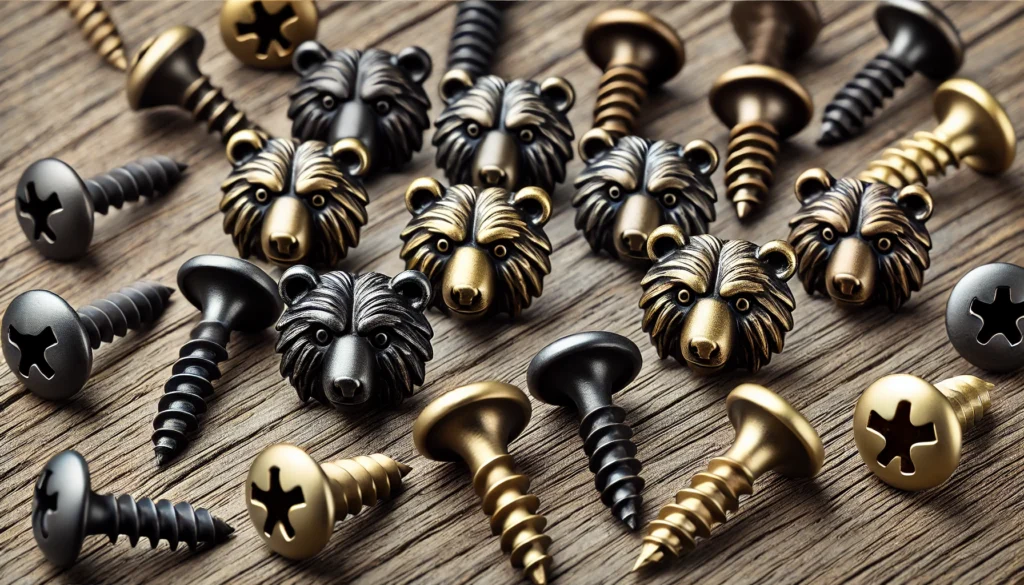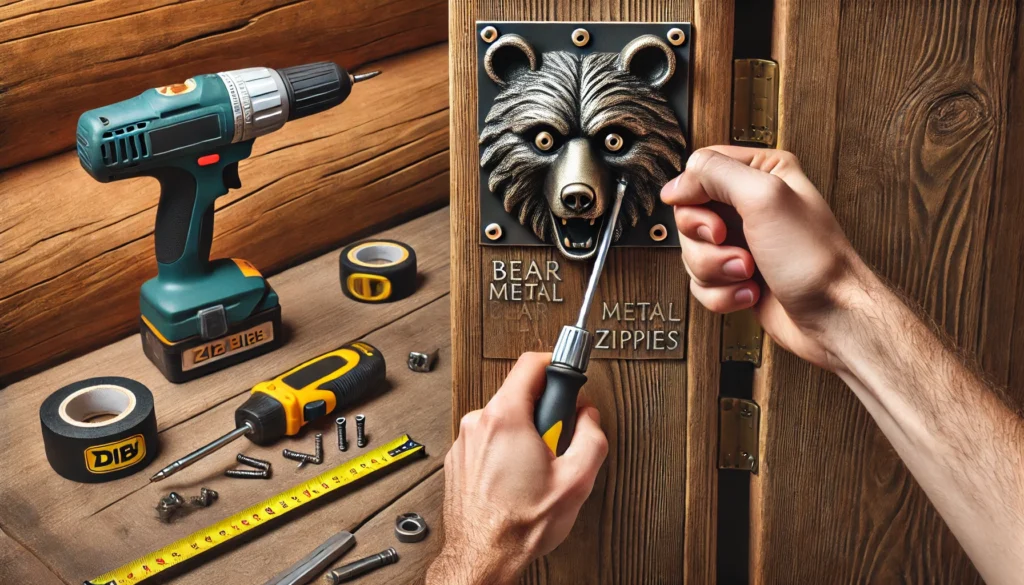Introduction
When it comes to combining functionality and aesthetics in hardware, the bear head metal zippies screw door stands out as an exceptional choice. These decorative screws are not only practical but also add a touch of rustic charm to doors, furniture, and other installations. In this guide, we’ll take an in-depth look at what makes these screws unique, their applications, and how to use them effectively.
Design and Aesthetic Appeal
The Symbolism of the Bear Head Design
The bear has long been a symbol of strength, resilience, and protection. Incorporating this design into screws gives an artistic and meaningful touch to your doors or furniture, making them ideal for homes with a rustic, cabin-style, or wildlife-themed decor.
How These Screws Enhance Door Aesthetics
Unlike ordinary screws, bear head metal zippies serve a dual purpose: they secure your doors while acting as a decorative element. Their intricate design draws attention and elevates the overall look of the door.
Popular Styles and Finishes
Bear head screws come in various styles and finishes, including antique bronze, matte black, and polished brass. This variety allows you to match them with different door materials and designs, ensuring cohesion in your decor.
Materials and Durability
Common Metals Used
Most bear head screws are made from durable materials like stainless steel, brass, or cast iron. These metals are chosen for their strength and resistance to wear and tear.
Corrosion Resistance and Longevity
For outdoor applications, screws with rust-resistant coatings are a must. Stainless steel and treated brass are particularly effective in resisting corrosion, ensuring the screws maintain their appearance and functionality for years.
Indoor vs. Outdoor Applications
While these screws are versatile, choosing the right material is essential. Stainless steel is ideal for outdoor use, while brass or cast iron can be reserved for indoor projects where they are less exposed to the elements.
Functionality and Practical Uses
How Bear Head Screws Work on Doors
Bear head screws are designed to secure doors firmly, providing a reliable fastening solution. Their unique shape ensures they not only hold well but also distribute pressure evenly.
Other Applications
These screws are not limited to doors. They can be used on furniture, cabinets, and even for decorative wall installations, making them a versatile addition to any toolkit.
Benefits Over Standard Screws
In addition to their aesthetic value, bear head screws offer superior durability and a unique look that standard screws cannot match. They’re an excellent choice for projects that require both style and functionality.
Choosing the Right Bear Head Metal Zippies
Factors to Consider
When selecting bear head screws, consider the size, material, and finish. Ensure the screws are compatible with your door’s material—whether wood, metal, or glass.
Matching Screws to Door Types
For wooden doors, choose screws with a brass or bronze finish for a classic look. For metal doors, stainless steel options are more appropriate, offering both strength and a modern aesthetic.
Customization Options
Some manufacturers offer customized bear head screws, allowing you to choose specific designs, finishes, or even engraving for a truly unique touch.
Installation Guide
Tools You’ll Need
To install bear head screws, you’ll need a screwdriver, drill, level, and measuring tape. Depending on the door material, additional tools may be required.
Step-by-Step Instructions
- Measure and Mark: Identify where you want to place the screws. Use a pencil and level to ensure accuracy.
- Drill Pilot Holes: For hard materials like metal or hardwood, drill pilot holes to prevent splitting or cracking.
- Insert Screws: Align the bear head screws with the pilot holes and use a screwdriver or drill to secure them in place.
- Check Alignment: Ensure all screws are properly aligned for a neat and professional appearance.
Common Mistakes to Avoid
- Using the wrong screw size.
- Over-tightening, which can damage the screw or material.
- Skipping pilot holes, leading to misalignment.
Maintenance and Care
Cleaning and Polishing Tips
Regular cleaning with a soft cloth and mild soap can keep the screws looking new. Avoid abrasive cleaners, as they may damage the finish.
Preventing Corrosion or Wear
Apply a protective coating or wax periodically, especially for outdoor screws, to prevent rust and maintain their shine.
When to Replace or Upgrade
If the screws show signs of corrosion or wear, it’s best to replace them promptly to avoid compromising the door’s security.
FAQs About Bear Head Metal Zippies Screw Door
Can bear head metal zippies be used in historical restorations?
Yes, they are excellent for period-accurate restorations, especially in rustic or early-American themed properties.
What tools are best for removing old or damaged screws?
A screw extractor or a manual wrench can effectively remove old or stripped screws without damaging the surrounding material.
Are there eco-friendly options for bear head screws?
Yes, some manufacturers offer recycled metal options that are both sustainable and durable.
How do I ensure the screws match my door hinges?
Look for finishes and materials that complement your hinges for a cohesive look.
Can these screws support heavy-duty applications like gates?
Absolutely, but ensure you select screws specifically rated for heavy loads and outdoor use.
Conclusion
Bear head metal zippies screw doors combine practicality and style, making them an excellent choice for both functional and decorative purposes. Whether you’re enhancing a rustic cabin door or adding character to your furniture, these screws deliver both durability and aesthetic appeal. By following this guide, you can choose, install, and maintain these unique screws with confidence. Explore the possibilities and give your doors and projects a distinctive touch!
Recommended Articles
Yoruma Jalkh George Washington: A Comprehensive Guide
Coach Oxford Bag NYFW: A Comprehensive Guide
Complete Guide to Memorex.com 2650MMO Download and Usage
The Soundary Cycle Sac Made in France: A Comprehensive Guide
Dr. Tera Raj: Union NJ’s Leading Endocrinology Expert



